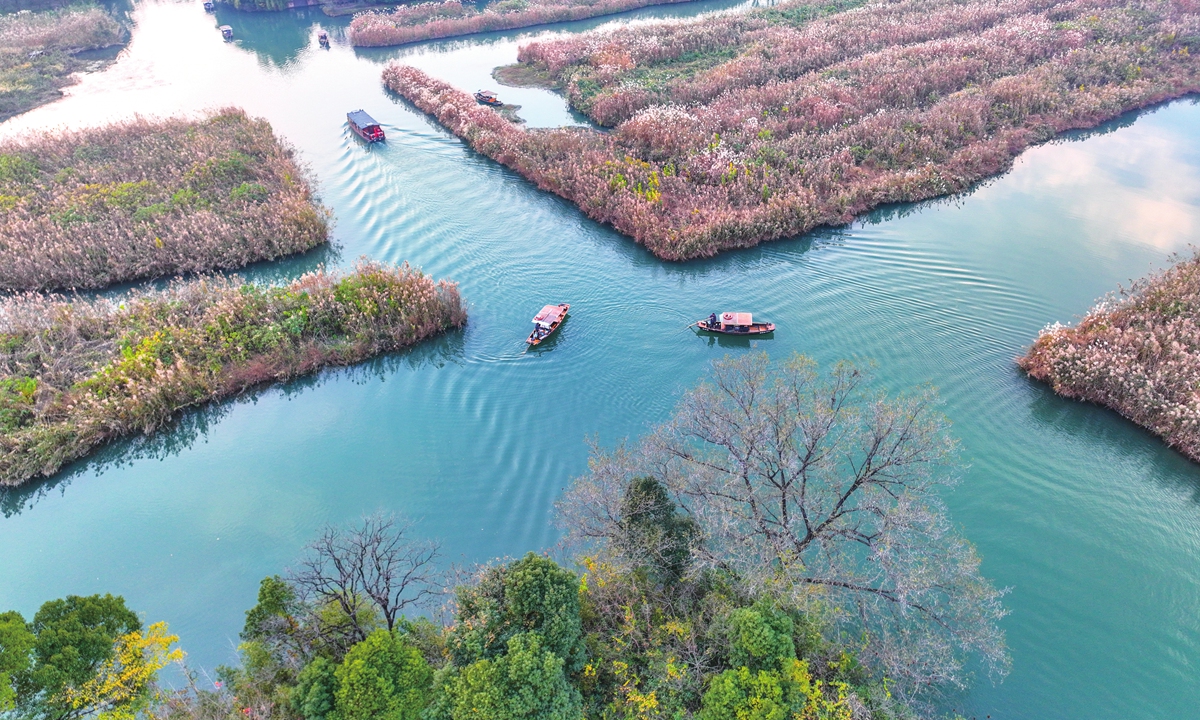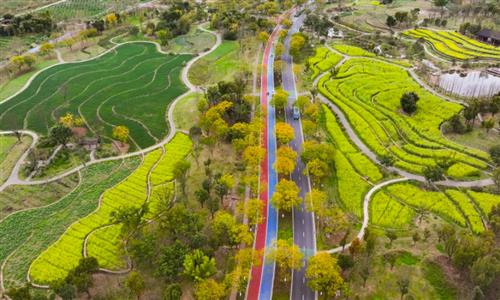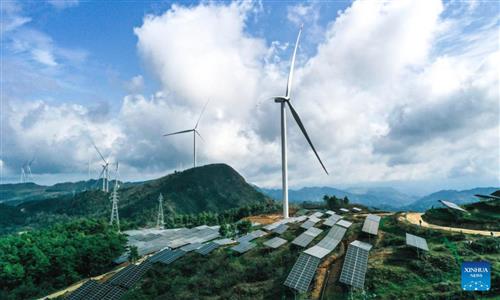IN-DEPTH / DIPLOMATIC CHANNEL
China’s achievement in ecological conservation an inspiration to global efforts: UNEP executive director
Editor's Note:
June 5 is World Environment Day. According to China's Ministry of Ecology and Environment, the theme for World Environment Day in 2024 is "Comprehensively Advancing the Construction of a Beautiful China."
It aims to guide the whole society to firmly establish and practice the concept that "lucid waters and lush mountains" are mountains of gold and silver and to mobilize all sectors of society to actively participate in the construction of a "beautiful China" and the great practice of achieving harmonious coexistence between humans and nature in modernization.
In the context of this important background, Inger Andersen, the Under-Secretary-General of the United Nations and Executive Director of the UN Environment Programme, was recently interviewed by the Global Times and other Chinese media outlets, discussing China's leadership role and contributions to global biodiversity conservation. In particular, the recent launch of the Kunming Biodiversity Fund marks China's significant support and investment in the global ecological protection cause.
World Environment Day, which falls on June 5th each year, is one of the main activities hosted by the United Nations to promote global environmental awareness, raise governmental attention to environmental issues, and encourage action. On this day, the United Nations system and governments around the world carry out various activities to publicize and emphasize the importance of protecting and improving the ecological environment.

Step by step
There is an old Chinese saying: "A journey of a thousand miles begins with a single step." China's approach to ecological and environmental protection and restoration embodies this principle.
A recent move has further advanced global biodiversity conservation efforts.
The Kunming Biodiversity Fund, a China-initiated fund aimed at supporting biodiversity conservation in developing countries, was officially launched via a signing ceremony in Beijing on May 29, witnessed by officials from China's Ministry of Ecology and Environment and relevant United Nations agencies.
In October 2021, China announced an initiative to establish the Kunming Biodiversity Fund, taking the lead by investing 1.5 billion yuan ($233 million) during the 15th meeting of the Conference of the Parties to the Convention on Biological Diversity, also known as COP 15, held in Kunming, Southwest China's Yunnan Province. It was announced that the fund would be used to support biodiversity protection in developing countries.
"It is a very large contribution that China has made to developing countries in the Global South, in a sign of solidarity to support those countries in conserving and reversing their loss of biodiversity," Andersen told the Global Times.
"Now, the reality is that many countries don't have the resources needed to be able to do biodiversity conservation," Andersen noted, highlighting that it is particularly challenging for poorer countries to address environmental issues due to a significant funding gap.
Andersen expressed optimism about the fund's potential to fill many gaps in conservation efforts. Additionally, she highlighted that China has valuable domestic experiences in conserving biodiversity, which can be learned from and shared with other countries to further global environmental initiatives.
In terms of the Kunming Biodiversity Fund's use, Andersen noted that the fund is intended to address the common challenges faced by the Global South, such as capacity constraints, institutional weaknesses, and resource limitations.
She emphasized that the fund will be critical in providing technical assistance, capacity building, and scientific insights to these countries, enabling them to eventually sustain their own biodiversity efforts according to their national priorities.

Andersen also highlighted the importance of sustainability in the projects funded by the Kunming Biodiversity Fund. She defined a sustainable project as one that continues to have an impact even after the funding ends, due to community ownership, legal changes, or strong institutional support.
Furthermore, Andersen mentioned the establishment of a steering committee, co-chaired by Minister Huang Runqiu of the Ministry of Ecology and Environment and herself, which will ensure a balanced consideration of all requests to maintain fairness and transparency in the distribution of resources.
China's role
China took over the presidency of COP15 in November 2018. However, due to the pandemic, China stayed at the helm for six years, instead of the normal two-year COP presidency term.
"These six years were a heavy burden for China to carry for the world. I am sure. But China has served with distinction," Andersen noted. "China has not shied away from leadership, and the world has enjoyed that strong leadership in the The Convention on Biological Diversity (CBD)."
She also paid tribute to Minister Huang, whose leadership was pivotal in securing the agreement. "We have, under the Chinese presidency of the biodiversity convention, reached a historic agreement, an agreement by which we agreed on 23 goals that we can all support to conserve biodiversity so that we can live on a healthier planet," she said.
At COP15, the Kunming-Montreal Global Biodiversity Framework, aimed at reversing biodiversity loss and setting the world on a path of recovery, was adopted. The framework has four long-term goals for 2050 and 23 action-oriented global targets over the decade to 2030.

Additionally, a new fund was established under the Chinese presidency under the Global Environment Facility, known as the Global Biodiversity Framework Fund, she said.
China was one of the first countries to submit its biodiversity plan back in 1994, Anderson mentioned, noting that China is among the top 12 mega-diverse countries in the world due to its vast size and unique ecosystems, including grasslands, deserts, coral reefs, forests, wetlands, mangroves, and extensive rivers.
She praised China's domestic efforts in biodiversity conservation, highlighting the establishment of national parks and China's remarkable progress in mangrove restoration, which she says is the fastest in the world. "China is a country that has the most rapid regrowth of mangroves," she remarked, pointing to the protective measures for a large number of wetlands that have been designated for conservation.
Andersen especially noted China's real efforts in conserving forests and wetlands with the innovative system of "redlining," which helps delineate permissible activities within protected areas to achieve biodiversity goals.
Furthermore, Andersen pointed to China's ambitious ecological restoration projects, such as the one covering 75 large-scale ecosystems, which has already restored 2 million hectares with a goal to restore 10 million hectares by 2030. "China is also creating green jobs," she noted, with approximately 3 million jobs expected to be created by the same year.
She emphasized the importance of ecological civilization, a concept that promotes living in harmony with nature, and the powerful imagery of "lucid waters and lush mountains" that leaders use to inspire people's imagination about the possibilities of protecting nature. "The ecological civilization construct is very meaningful. When leaders speak of lucid waters and lush mountains, that's a powerful notion that people can understand," Andersen said.
She mentioned that stories about China's efforts in conserving the ecology and environment have impressed her.

Similarly, the elephants of Yunnan captured the world's attention during COP 15, as they traversed the landscape in a journey that Andersen described as "very powerful." Their movement through the country was not just a natural event but a symbolic message, demonstrating the potential for greater harmony between humans and wildlife.
Jointing hands
In terms of biodiversity conservation, there is indeed a significant funding gap, indicating that countries need to make greater efforts to provide the necessary support.
Andersen mentioned that approximately $700 billion is needed annually to bridge this gap. The Kunming Biodiversity Fund plays a critical role, offering a generous contribution of $220 million over a 10-year period. This represents a new resource that was not previously included in the available funding calculations.
She emphasized the need to address negative subsidies that contribute to harmful practices such as overuse of chemicals, fertilizers, over-extraction, deforestation, and overfishing, which are estimated to be 30 times higher than the funding for positive impacts.
Under the Chinese presidency, the world has agreed to revisit subsidies as part of the Kunming-Montreal Global Biodiversity Agreement to ensure they are not negatively impacting nature. Each country is encouraged to assess its subsidies and their effects on biodiversity, she noted.

She also emphasized the critical role of developed countries in shifting financial flows from activities that harm nature to those that promote its healing. "Developed countries can do more to shift nature-harming sub-financial flows to nature-healing flows," said Andersen.
"All countries can really look at their agricultural subsidies to support food production with biodiversity, not against biodiversity, with the rehabilitation of degraded lands, not by going in and encroaching on virgin lands," she said.
Looking forward to the upcoming COP 16 in October in Cali, Columbia, Andersen noted that each country will present its plan on how it intends to meet the targets set by the framework. She hopes to see real progress on funding at COP 16, with the establishment of the Kunming Biodiversity Fund being a significant step forward.
Andersen expects COP 16 to continue the high ambition set by China with the global biodiversity framework and to recognize nature's role as a peacemaker.
She also anticipates that often unheard voices, such as those of indigenous people and Afro-descendants, will be prominently acknowledged at the conference. "They want to have strong voices for indigenous people and for Afro descendants," Andersen quoted, acknowledging the critical role these communities play as stewards of the land.
June 5 is World Environment Day. According to China's Ministry of Ecology and Environment, the theme for World Environment Day in 2024 is "Comprehensively Advancing the Construction of a Beautiful China."
It aims to guide the whole society to firmly establish and practice the concept that "lucid waters and lush mountains" are mountains of gold and silver and to mobilize all sectors of society to actively participate in the construction of a "beautiful China" and the great practice of achieving harmonious coexistence between humans and nature in modernization.
In the context of this important background, Inger Andersen, the Under-Secretary-General of the United Nations and Executive Director of the UN Environment Programme, was recently interviewed by the Global Times and other Chinese media outlets, discussing China's leadership role and contributions to global biodiversity conservation. In particular, the recent launch of the Kunming Biodiversity Fund marks China's significant support and investment in the global ecological protection cause.
World Environment Day, which falls on June 5th each year, is one of the main activities hosted by the United Nations to promote global environmental awareness, raise governmental attention to environmental issues, and encourage action. On this day, the United Nations system and governments around the world carry out various activities to publicize and emphasize the importance of protecting and improving the ecological environment.

Hangzhou Xixi natural reserve in East China's Zhejiang Province
Step by step
There is an old Chinese saying: "A journey of a thousand miles begins with a single step." China's approach to ecological and environmental protection and restoration embodies this principle.
A recent move has further advanced global biodiversity conservation efforts.
The Kunming Biodiversity Fund, a China-initiated fund aimed at supporting biodiversity conservation in developing countries, was officially launched via a signing ceremony in Beijing on May 29, witnessed by officials from China's Ministry of Ecology and Environment and relevant United Nations agencies.
In October 2021, China announced an initiative to establish the Kunming Biodiversity Fund, taking the lead by investing 1.5 billion yuan ($233 million) during the 15th meeting of the Conference of the Parties to the Convention on Biological Diversity, also known as COP 15, held in Kunming, Southwest China's Yunnan Province. It was announced that the fund would be used to support biodiversity protection in developing countries.
"It is a very large contribution that China has made to developing countries in the Global South, in a sign of solidarity to support those countries in conserving and reversing their loss of biodiversity," Andersen told the Global Times.
"Now, the reality is that many countries don't have the resources needed to be able to do biodiversity conservation," Andersen noted, highlighting that it is particularly challenging for poorer countries to address environmental issues due to a significant funding gap.
Andersen expressed optimism about the fund's potential to fill many gaps in conservation efforts. Additionally, she highlighted that China has valuable domestic experiences in conserving biodiversity, which can be learned from and shared with other countries to further global environmental initiatives.
In terms of the Kunming Biodiversity Fund's use, Andersen noted that the fund is intended to address the common challenges faced by the Global South, such as capacity constraints, institutional weaknesses, and resource limitations.
She emphasized that the fund will be critical in providing technical assistance, capacity building, and scientific insights to these countries, enabling them to eventually sustain their own biodiversity efforts according to their national priorities.

Inger Andersen, the Under-Secretary-General of the United Nations and Executive Director of the UN Environment Programme Photo: Shan Jie/GT
Andersen also highlighted the importance of sustainability in the projects funded by the Kunming Biodiversity Fund. She defined a sustainable project as one that continues to have an impact even after the funding ends, due to community ownership, legal changes, or strong institutional support.
Furthermore, Andersen mentioned the establishment of a steering committee, co-chaired by Minister Huang Runqiu of the Ministry of Ecology and Environment and herself, which will ensure a balanced consideration of all requests to maintain fairness and transparency in the distribution of resources.
China's role
China took over the presidency of COP15 in November 2018. However, due to the pandemic, China stayed at the helm for six years, instead of the normal two-year COP presidency term.
"These six years were a heavy burden for China to carry for the world. I am sure. But China has served with distinction," Andersen noted. "China has not shied away from leadership, and the world has enjoyed that strong leadership in the The Convention on Biological Diversity (CBD)."
She also paid tribute to Minister Huang, whose leadership was pivotal in securing the agreement. "We have, under the Chinese presidency of the biodiversity convention, reached a historic agreement, an agreement by which we agreed on 23 goals that we can all support to conserve biodiversity so that we can live on a healthier planet," she said.
At COP15, the Kunming-Montreal Global Biodiversity Framework, aimed at reversing biodiversity loss and setting the world on a path of recovery, was adopted. The framework has four long-term goals for 2050 and 23 action-oriented global targets over the decade to 2030.

A golden monkey in Qinling mountains, Northwest China's Shaanxi Province
Additionally, a new fund was established under the Chinese presidency under the Global Environment Facility, known as the Global Biodiversity Framework Fund, she said.
China was one of the first countries to submit its biodiversity plan back in 1994, Anderson mentioned, noting that China is among the top 12 mega-diverse countries in the world due to its vast size and unique ecosystems, including grasslands, deserts, coral reefs, forests, wetlands, mangroves, and extensive rivers.
She praised China's domestic efforts in biodiversity conservation, highlighting the establishment of national parks and China's remarkable progress in mangrove restoration, which she says is the fastest in the world. "China is a country that has the most rapid regrowth of mangroves," she remarked, pointing to the protective measures for a large number of wetlands that have been designated for conservation.
Andersen especially noted China's real efforts in conserving forests and wetlands with the innovative system of "redlining," which helps delineate permissible activities within protected areas to achieve biodiversity goals.
Furthermore, Andersen pointed to China's ambitious ecological restoration projects, such as the one covering 75 large-scale ecosystems, which has already restored 2 million hectares with a goal to restore 10 million hectares by 2030. "China is also creating green jobs," she noted, with approximately 3 million jobs expected to be created by the same year.
She emphasized the importance of ecological civilization, a concept that promotes living in harmony with nature, and the powerful imagery of "lucid waters and lush mountains" that leaders use to inspire people's imagination about the possibilities of protecting nature. "The ecological civilization construct is very meaningful. When leaders speak of lucid waters and lush mountains, that's a powerful notion that people can understand," Andersen said.
She mentioned that stories about China's efforts in conserving the ecology and environment have impressed her.

A panda sleeps on a tree in Southwest China's Sichuan Province Photos: VCG
For instance, the giant panda, once under threat and listed as endangered, has seen a remarkable turnaround thanks to China's conservation efforts. "We now can see that the population of wild pandas is growing so much so that the IUCN has moved the listing from endangered to vulnerable," said Andersen, highlighting the success of these protective measures.Similarly, the elephants of Yunnan captured the world's attention during COP 15, as they traversed the landscape in a journey that Andersen described as "very powerful." Their movement through the country was not just a natural event but a symbolic message, demonstrating the potential for greater harmony between humans and wildlife.
Jointing hands
In terms of biodiversity conservation, there is indeed a significant funding gap, indicating that countries need to make greater efforts to provide the necessary support.
Andersen mentioned that approximately $700 billion is needed annually to bridge this gap. The Kunming Biodiversity Fund plays a critical role, offering a generous contribution of $220 million over a 10-year period. This represents a new resource that was not previously included in the available funding calculations.
She emphasized the need to address negative subsidies that contribute to harmful practices such as overuse of chemicals, fertilizers, over-extraction, deforestation, and overfishing, which are estimated to be 30 times higher than the funding for positive impacts.
Under the Chinese presidency, the world has agreed to revisit subsidies as part of the Kunming-Montreal Global Biodiversity Agreement to ensure they are not negatively impacting nature. Each country is encouraged to assess its subsidies and their effects on biodiversity, she noted.

Students display their hand-written newspapers on the theme of Environmental Day in a school in Zhenjiang, East China's Jiangsu Province on June 3, 2024.
She also emphasized the critical role of developed countries in shifting financial flows from activities that harm nature to those that promote its healing. "Developed countries can do more to shift nature-harming sub-financial flows to nature-healing flows," said Andersen.
"All countries can really look at their agricultural subsidies to support food production with biodiversity, not against biodiversity, with the rehabilitation of degraded lands, not by going in and encroaching on virgin lands," she said.
Looking forward to the upcoming COP 16 in October in Cali, Columbia, Andersen noted that each country will present its plan on how it intends to meet the targets set by the framework. She hopes to see real progress on funding at COP 16, with the establishment of the Kunming Biodiversity Fund being a significant step forward.
Andersen expects COP 16 to continue the high ambition set by China with the global biodiversity framework and to recognize nature's role as a peacemaker.
She also anticipates that often unheard voices, such as those of indigenous people and Afro-descendants, will be prominently acknowledged at the conference. "They want to have strong voices for indigenous people and for Afro descendants," Andersen quoted, acknowledging the critical role these communities play as stewards of the land.




